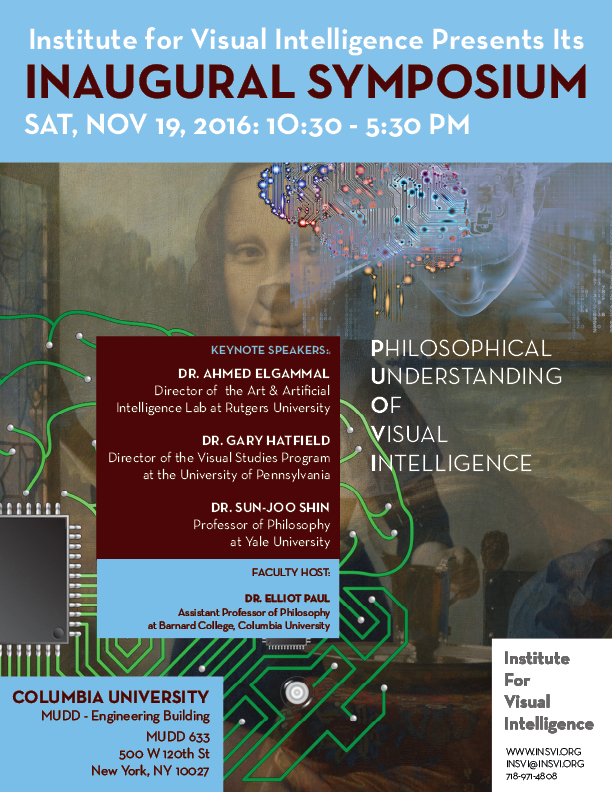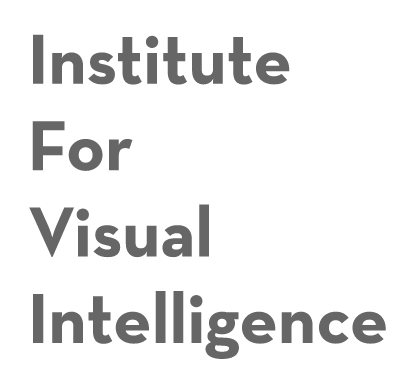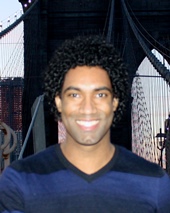
We are pleased to report the success of our Inaugural Symposium, a summary of the proceedings for which may be requested by by email.
We are currently corresponding with publishers to partner on a series of volumes of conferences proceedings and related monograph publications in the future.
Topic: What is a philosophical understanding of visual intelligence?
Keywords: analytic philosophy, fine art, intelligence, logic, artificial intelligence, data science & mining, philosophy of mind, epistemology, philosophy of language, grammar, philosophy of games, visual studies, aesthetics, art history & criticism, psychology, philosophy of science.
Problem Solving:
– Are most well-known aestheticians and philosophers of art visually intelligent?
– Problems with using logic to analyze artwork
– Why is the difference between the philosophy of art and aesthetics significant?
– How are subjectively universal judgments of taste possible?
– Why is visual intelligence significant in measuring human capacities?
– Can a machine achieve unsupervised visual intelligence?
– In what ways is art making mathematical?
– What is the difference between visual intelligence and spatial intelligence?
Keynote Speakers:

Dr. Ahmed Elgammal
Director of the Art & AI Lab at Rutgers University
Professor at the Department of Computer Science, Rutgers University. He is the founder and director of the Art and Artificial Intelligence at Rutgers, which focuses on data science in the domain of digital humanities. He is also an Executive Council Faculty at Rutgers University Center for Cognitive Science. Prof Elgammal has published over 140 peer-reviewed papers, book chapters, and books in the fields of computer vision, machine learning, and digital humanities. He is a senior member of the Institute of Electrical and Electronics Engineers (IEEE). He received the National Science Foundation CAREER Award in 2006. Dr Elgammal’s recent research on knowledge discovery in digital humanities received wide international media attention, including reports on the Washington Post, New York Times, NBC News, the Daily Telegraph, Science News, and many others.

Dr. Gary Hatfield
Director of the Visual Studies Program at the University of Pennsylvania
Adam Seybert Professor in Moral and Intellectual Philosophy and Director of the Visual Studies Program at the University of Pennsylvania. He works in the history of modern philosophy, the philosophy of psychology, theories of vision, and the philosophy of science. In 1990, he published The Natural and the Normative: Theories of Spatial Perception from Kant to Helmholtz; at HOPOS 2016, the 25th anniversary of the book was celebrated. In 2009, Perception and Cognition: Essays in the Philosophy of Psychology appeared from the Clarendon Press; a revised version of his book on Descartes’ Meditations appeared in 2014. He is a member of the Center for Cognitive Neuroscience, the Penn Perception group, and the History and Sociology of Science Graduate Group. He has directed dissertations in history of philosophy, philosophy of psychology, and philosophy and history of science. He has long been fascinated by visual perception and the mind–body problem.

Dr. Sun-Joo Shin
Professor of Philosophy at Yale University
At Yale Sun-Joo Shin teaches logic, philosophy of logic, history of logic, philosophy of linguistics and, philosophy of language.
In her book “The Iconic Logic of Peirce’s Graphs” Shin explores the philosophical roots of the birth of Peirce’s Existential Graphs in his theory of representation and logical notation. She demonstrates that Peirce is the first philosopher to lay a solid philosophical foundation for multimodal representation systems.
FACULTY HOST
Dr. Elliot Samuel Paul
Assistant Professor of Philosophy at Barnard College, Columbia University.
He works mainly in early modern philosophy and epistemology. He also has interests in philosophy of mind and cognitive science, with a particular focus on philosophical issues surrounding creativity. He holds a BA from the University of Toronto and a Ph.D from Yale University, both in philosophy. From 2009-2011 Dr. Paul was Assistant Professor/Bersoff Faculty Fellow at NYU. He is co-editor of The Philosophy of Creativity: New Essays, published by Oxford University Press in 2014, and is currently completing a book on Descartes’s epistemology.


Sorry, the comment form is closed at this time.